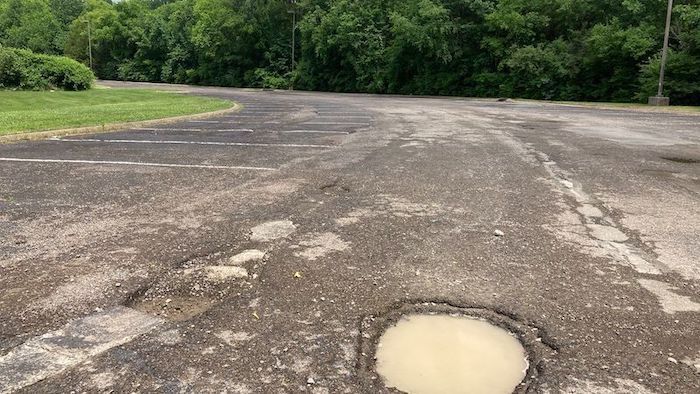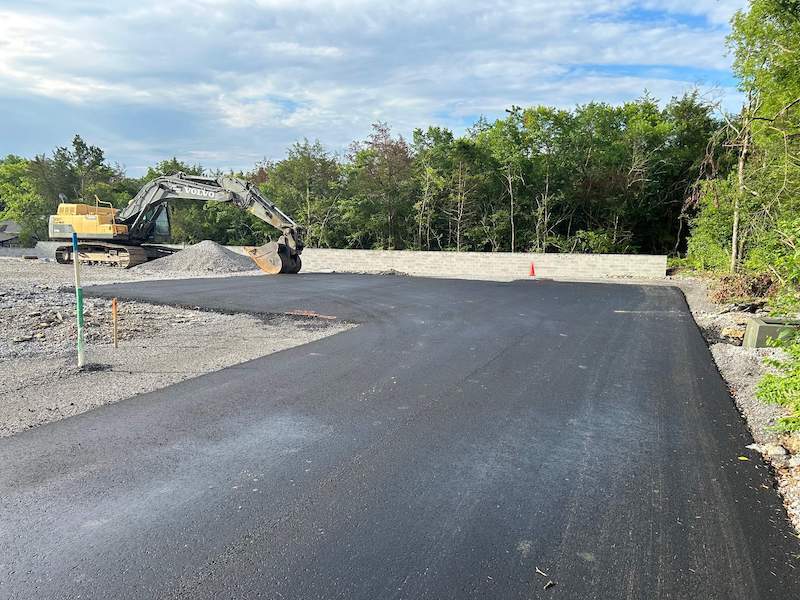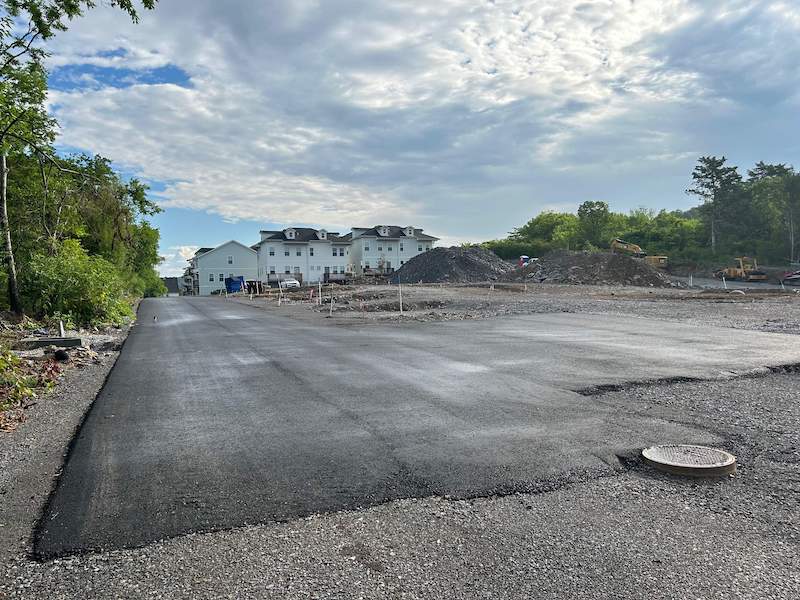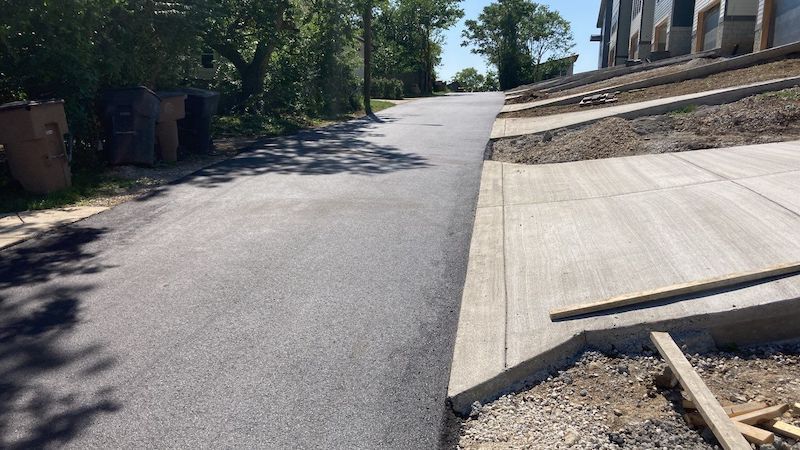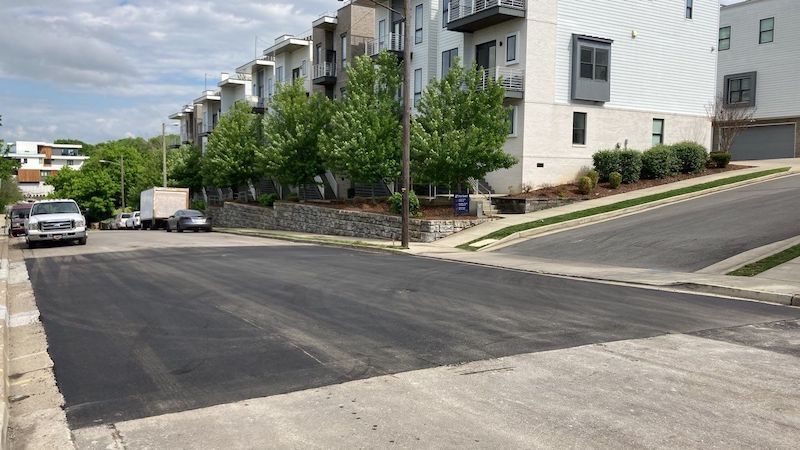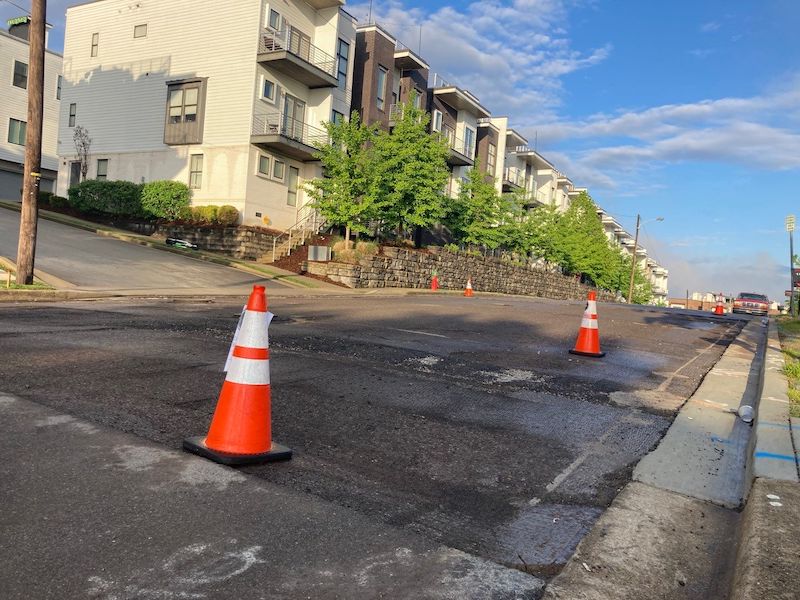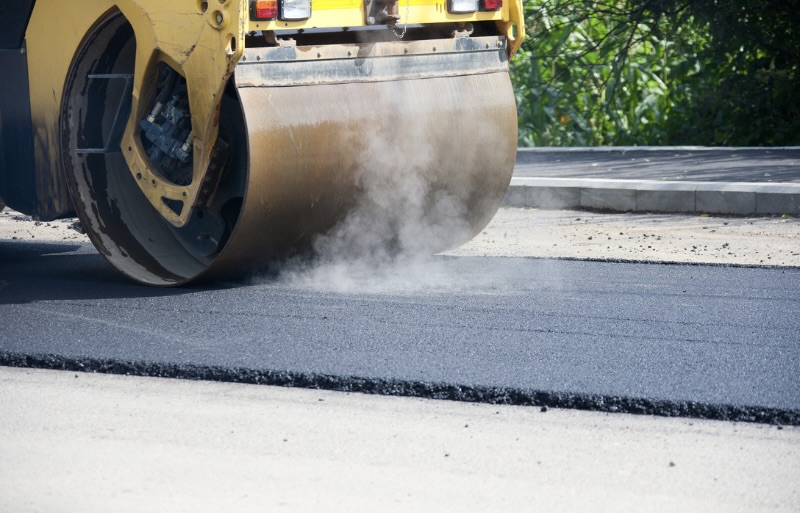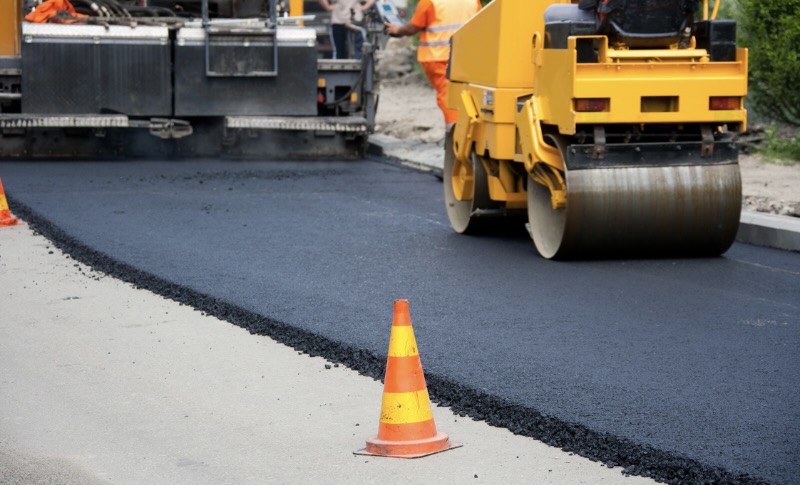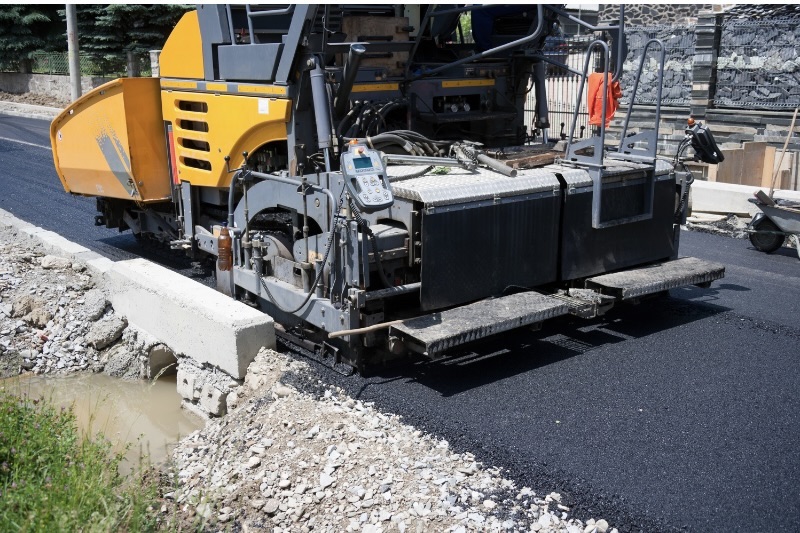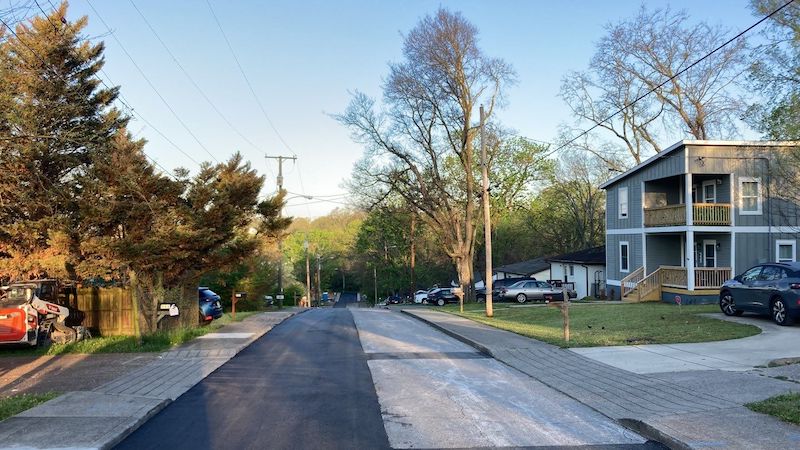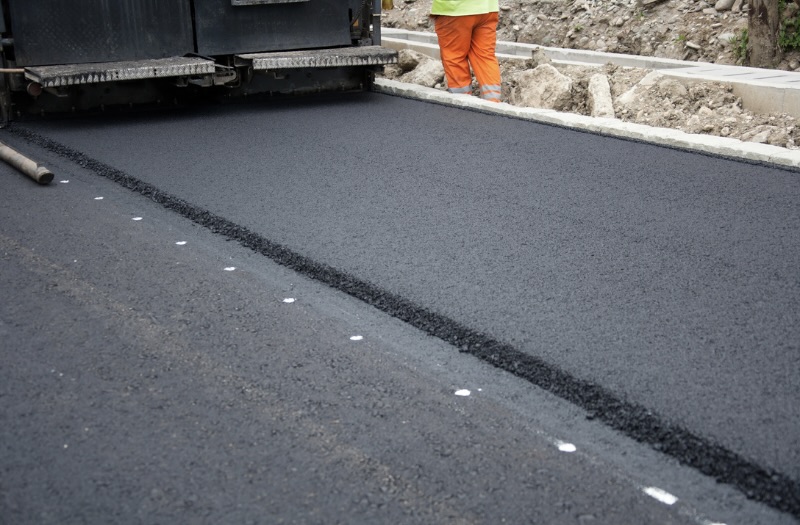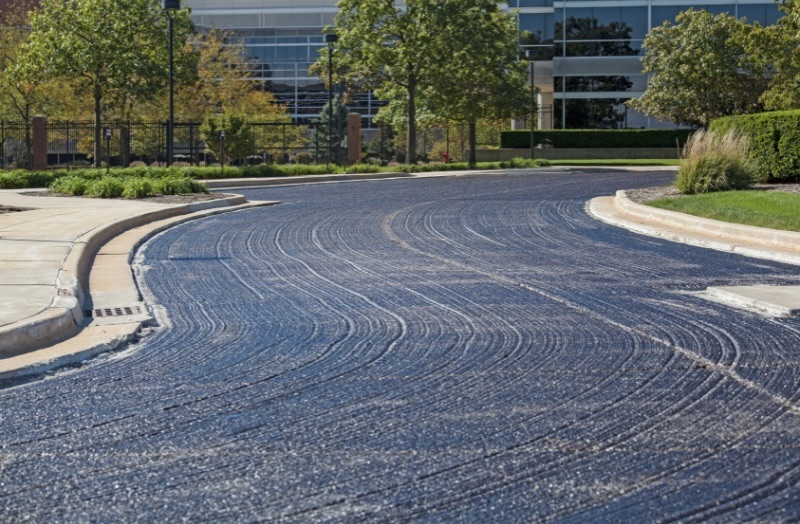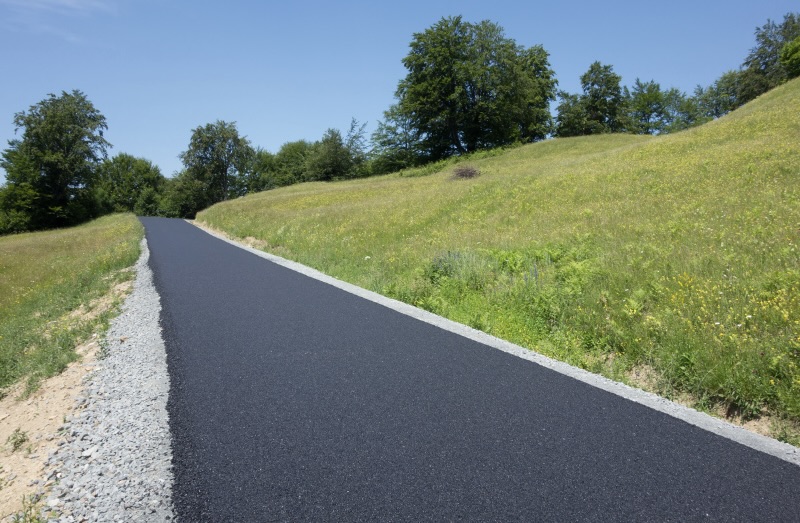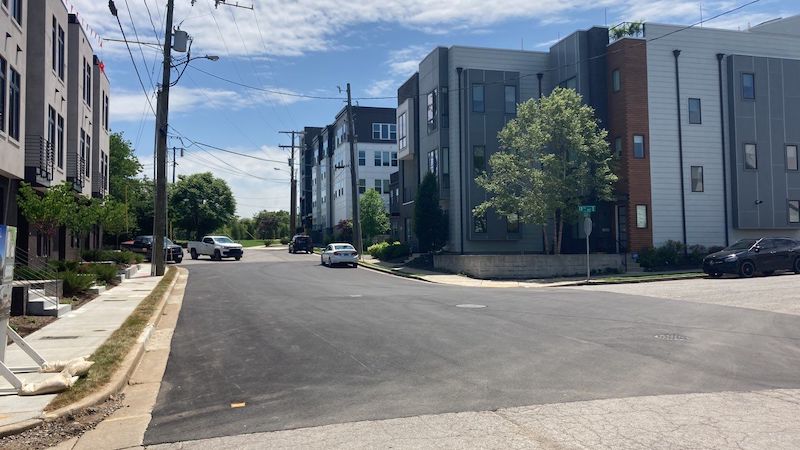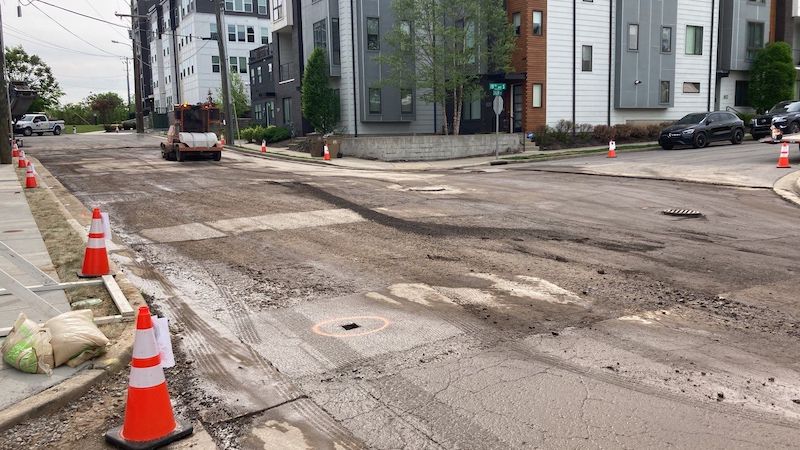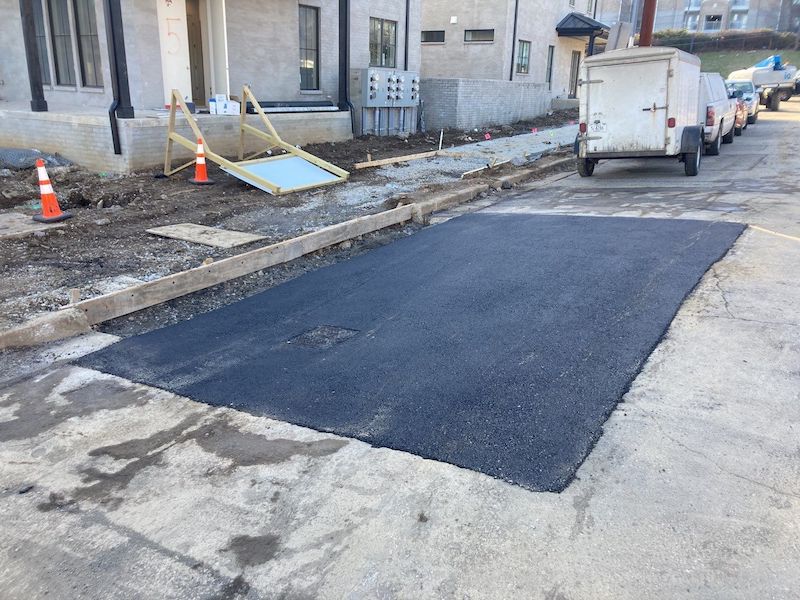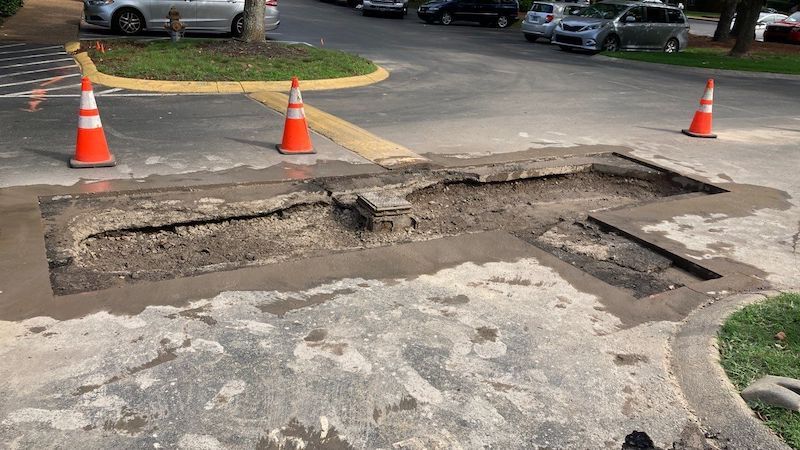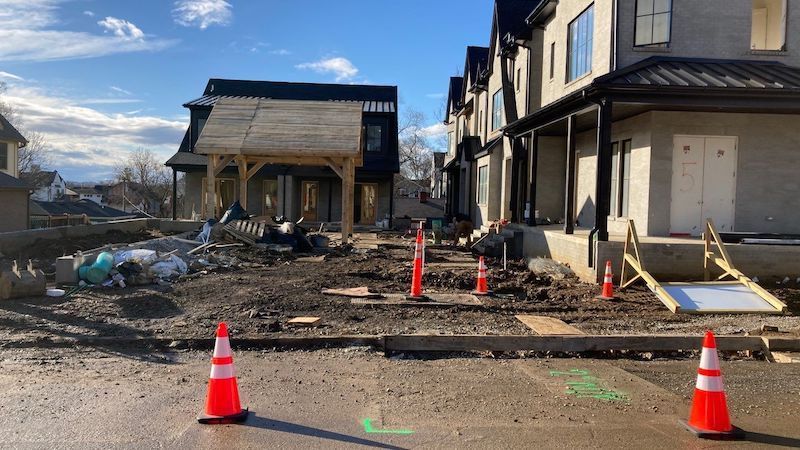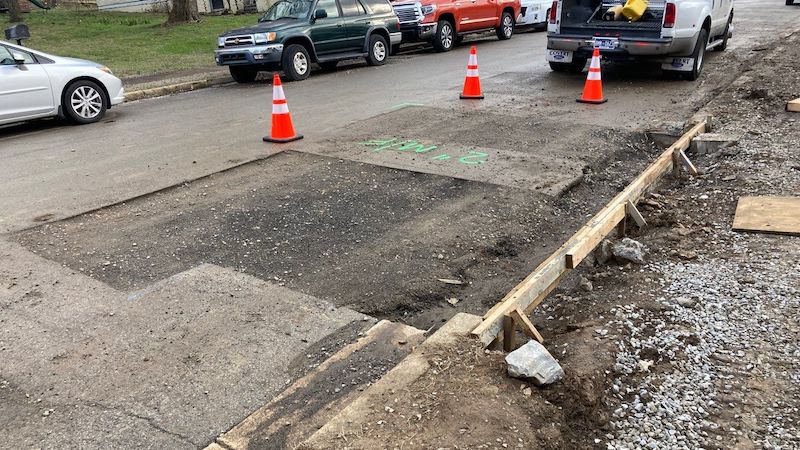Asphalt Repair for Businesses in Nashville
Nashville Asphalt Repair: Professional Solutions for Businesses
When keeping your Nashville-based business looking top-notch, pay attention to the substantial role that your asphalt surfaces play, including the asphalt paving in parking lots and driveways. Cracked or crumbling parking lots and driveways can negatively affect the impression your company leaves on customers. Installation and pavement maintenance is critical to avoid such scenarios. There’s no need to fret, though – here at Gaddes Strategic, LLC, we provide quality asphalt repair for businesses in Nashville seeking to restore their asphalt’s original appeal; this includes asphalt resurfacing for worn-out sections. We’re turning beaten-up lots into prime parking spaces in Music City with precision, skill, and industry-leading techniques! You can trust us to give you an accurate estimate before we start replacing or repairing your asphalt pavement. Dive into our discussion about our professional solutions and see how our expert team tackles common (and uncommon) asphalt-related issues.
Our Nashville-based asphalt repair company offers a myriad of services specifically tailored to meet the needs of local businesses. These include pothole repairs, crack sealing, parking lot striping for clear differentiation of parking spaces, and curb repairs. We provide competitive pricing and efficient service to ensure minimal downtime and maximum customer satisfaction. Contact us today for a free quote.
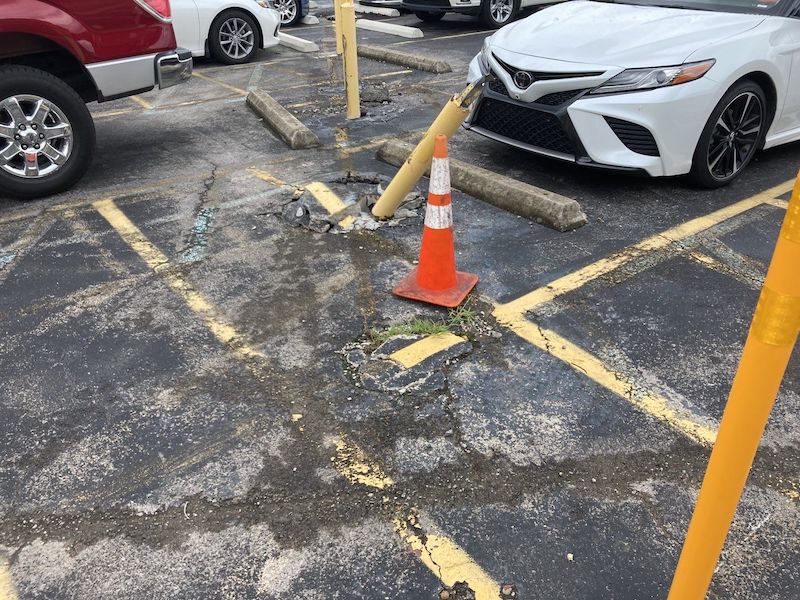
Asphalt Repair for Businesses in Nashville
For businesses in Nashville, maintaining their asphalt surfaces is crucial for aesthetics and safety. Whether it’s a parking lot, driveway, or access road, regular asphalt repair, including replacement and asphalt resurfacing, is essential to ensure a smooth, durable surface that can withstand heavy traffic and the demanding Tennessee climate.
Professional asphalt repair services can provide tailored solutions for businesses in Nashville. These services typically include pothole repairs, crack sealing, patching damaged areas, asphalt resurfacing worn-out sections, and even parking lot striping. By addressing these issues, businesses can promptly avoid potential liabilities caused by accidents or vehicle damage.
Types Of Asphalt Repairs
1. Pothole Repairs
2. Crack Sealing
3. Patching
4. Resurfacing
Imagine your business’s parking lot is riddled with potholes and cracks, presenting an unattractive appearance to customers and increasing the risk of accidents. By investing in professional asphalt repair and replacement services, you can transform your deteriorated asphalt pavement into a smooth and safe space that leaves a positive impression on visitors.
Properly repaired asphalt surfaces also contribute to efficient vehicle movement within your property. Smooth pavements allow for more straightforward navigation and reduce wear and tear on tires. This not only prolongs the lifespan of your customers’ vehicles but also improves the overall traffic flow, enhancing customer experience and satisfaction.
It’s worth noting that asphalt repair isn’t a one-time solution; regular pavement maintenance, including asphalt resurfacing, is necessary to ensure long-term durability. Businesses can benefit from ongoing maintenance plans tailored to their specific needs by partnering with a reputable asphalt repair company in Nashville.
Now that we understand the importance of asphalt repair for Nashville businesses let’s explore the benefits of regular asphalt maintenance. This includes regular rounds of parking lot striping for clearly demarcated parking spaces.
- According to the Federal Highway Administration, approximately 93% of paved roads in America are surfaced with asphalt due to its durability and cost-effectiveness.
- A study conducted in 2019 revealed that regular maintenance and timely repairs can extend the lifespan of an asphalt surface by up to 30%.
- Recent market analysis indicates that the global asphalt repair and maintenance industry is projected to reach $3.1 billion by 2024, demonstrating the worldwide demand for these services.
- Regular asphalt repair and maintenance are crucial for businesses in Nashville to ensure a safe, smooth, and attractive surface for customers. Professional asphalt repair services offer tailored solutions such as pothole repairs, crack sealing, patching damaged areas, and resurfacing worn-out sections. By addressing these issues promptly, businesses can avoid potential liabilities caused by accidents or vehicle damage. Regular maintenance is necessary to ensure long-term durability and efficient vehicle movement within the property. Partnering with a reputable asphalt repair company in Nashville can provide ongoing maintenance plans tailored to specific needs.
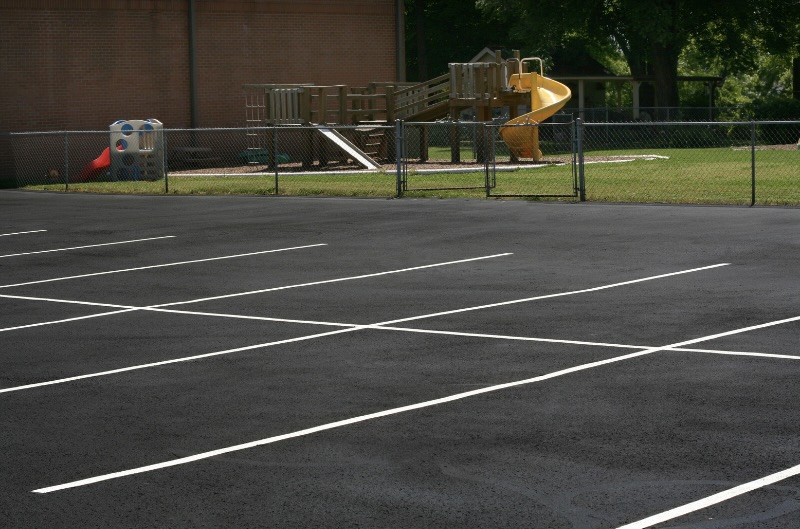
Benefits of Asphalt Repair for Businesses
Consider this scenario: A bustling restaurant in Nashville has a heavily used asphalt pavement parking lot that shows signs of wear and tear. If left unaddressed, the minor cracks and potholes could eventually expand, leading to costly repairs or complete asphalt resurfacing.
Regular asphalt maintenance, including parking lot striping and asphalt resurfacing, provides several significant benefits of professional asphalt repair for businesses in Nashville:
- Cost Savings: By conducting regular inspections and addressing minor issues promptly, businesses can prevent small repairs from turning into significant expenses. The cost of routine maintenance, including asphalt paving, installation, and replacement, is significantly lower than the expense associated with extensive repairs or complete resurfacing. Reach out to us today for a reliable estimate. Extended Lifespan: Just like any other infrastructure, proper maintenance, overseen by adept paving contractors, prolongs the lifespan of asphalt surfaces. Essential procedures such as seal coating, milling, and paving can help to maintain these surfaces. By regularly sealing cracks, patching potholes, and resurfacing as needed, businesses can maximize their investment by ensuring the longevity of their asphalt surfaces.
- Enhanced Safety: Well-maintained asphalt surfaces contribute to safer business environments. From the clear demarcation of lines to a uniform overlay, regular maintenance not only beautifies the surface but also eliminates hazards such as potholes that could cause accidents or trip hazards for customers and employees.
- Improved Aesthetics: A well-maintained parking lot or driveway leaves a positive impression on customers while enhancing your business’s overall curb appeal. Here, contractors play a vital role: Their attention to detail — from the seal coating to the paving — results in an improved reputation and increased foot traffic.
Now that we’ve explored the benefits of regular asphalt maintenance for businesses in Nashville let’s discuss how to assess driveways and repair potholes effectively using reliable paving contractors.
When it comes to maintaining the integrity of your asphalt driveway or parking lot, assessing its condition and promptly repairing any potholes is crucial. This task is best left to experienced contractors, who can effectively perform the milling and paving work required. A pothole is an unsightly nuisance and a potential safety hazard for vehicles and pedestrians alike. As a responsible business owner in Nashville, it’s important to prioritize regular inspections and proactively address any signs of wear and tear.
Assessing Driveways & Repairing Potholes
A visual inspection is the first step in assessing your driveway or parking lot. Note any visible cracks, depressions, or uneven surface areas. These can be indications of underlying issues that require immediate attention. For instance, if you notice small crevices, they can quickly worsen over time due to fluctuating temperatures and increased traffic. A professional contractor can detect these problems and apply the proper seal coating to prevent deterioration.
Next, thoroughly inspect the area for potholes. These are typically characterized by round or elongated openings that have been formed due to the weakening and deterioration of the asphalt. Pothole repair can vary from small and shallow to more extensive and deeper crevices. They often develop due to moisture infiltration and repeated stress on the pavement. This is precisely why top-notch paving contractors consider weather conditions when recommending maintenance schedules, ensuring the longevity of your investment.
Imagine you’re a business owner who has noticed several significant potholes forming in your parking lot after a particularly harsh winter. You’d likely turn to professional paving services with the right equipment to deal with this damage. Not only is this damaging to your company’s image, but it could also lead to accidents or damage to vehicles. Taking proactive steps towards repair is essential in such situations, and yielding this work to experienced paving contractors can put your mind at ease.
Once you have identified problem areas like cracks and potholes, it’s time to seek professional assistance for repairing them effectively. Though some minor cracks may seem manageable as DIY projects with basic sealant applications, significant damage like potholes requires the expertise of professional paving contractors.
Repairing potholes typically involves several steps: First, the damaged area must be cleaned thoroughly to remove any loose debris or vegetation hindering the repair process. Once clean, the site is usually heated to ensure proper adhesion of the asphalt repair material.
A hot mix asphalt or cold patch material is then applied to fill the pothole and compacted using heavy machinery, such as a roller. This compaction ensures a stable and durable surface, reducing the likelihood of future damage. Moreover, contractors may perform an additional overlay to ensure that the repaired area is smoothed out to match the surrounding pavement seamlessly.
Now that we understand the importance of assessing our driveways and repairing potholes promptly let’s shift our focus to recognizing early signs of asphalt wear and tear, a responsibility best undertaken by professional paving contractors. With their remarkable properties, asphalt surfaces are built to withstand significant wear and tear, but they are not invincible. Over time, exposure to harsh weather conditions, heavy traffic loads, and various other factors can cause visible signs of deterioration. Business owners in Nashville must have accurate information and recognize these signs early on to address any underlying issues before they become major problems.
One common sign of asphalt wear and tear is the development of cracks. These can range from small hairline cracks known as “alligator cracks” to larger linear damages caused by thermal expansion and contraction. Cracks provide an entry point for water and moisture, which can further weaken the pavement structure. Prompt asphalt sealcoating can fill these cracks and prevent future ones, making it a valuable avenue in maintaining your site.
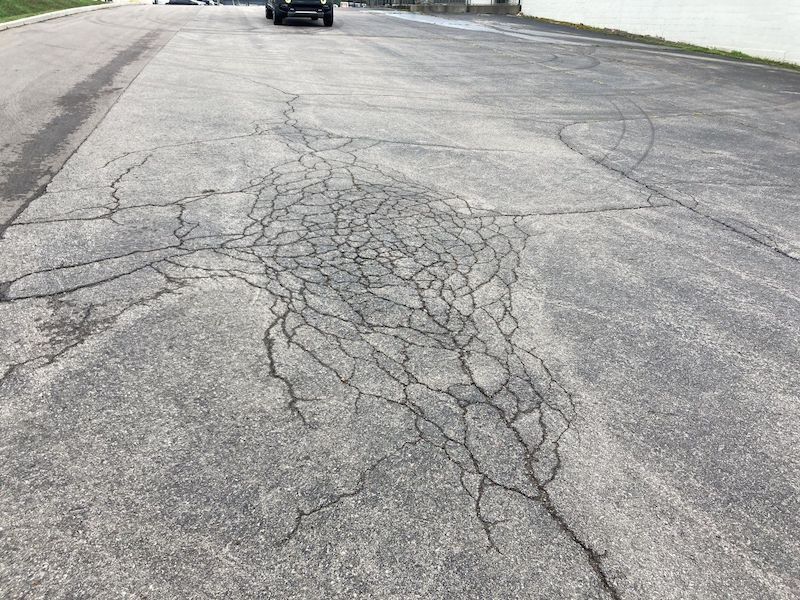
Recognizing Signs of Asphalt Wear and Tear
Another indicator of deteriorating asphalt is surface roughness or unevenness. If your diligent crew observes your parking lot or driveway becoming bumpy or uneven over time, it may indicate sub-base failures or inadequate compaction during the initial construction job. Uneven surfaces affect the aesthetics and can lead to drainage issues and increase the risk of accidents.
For instance, imagine you’re a business owner who has invested in a well-constructed asphalt parking lot. However, after years of use, you start noticing numerous cracks forming throughout the surface, making it appear worn and neglected. Addressing these signs promptly can save you from costly repairs or the need for complete resurfacing. The price of ignoring these symptoms can be steep in the long run.
Other noticeable signs of asphalt wear include faded or worn-out markings or striping, as well as the appearance of potholes. These signs should not be ignored, as they indicate a compromised pavement structure that requires professional attention.
Now that we’ve covered the importance of recognizing signs of asphalt wear and tear, and understanding the role of a skilled crew, let’s move forward to the next section: choosing a reliable Nashville asphalt repair service.
Regarding asphalt repair for your business in Nashville, selecting a reliable and reputable service provider is crucial. With numerous options available, how do you ensure you make the right choice? Consider the following factors to guide your decision-making process.
First and foremost, reputation speaks volumes about the quality of work an asphalt repair service provides. Seek recommendations from other businesses in the area or conduct thorough research online to find companies with positive reviews and testimonials. It’s also helpful to ask for references from prospective service providers and inquire about their track record of completing projects on time and within budget.
Choosing a Reliable Nashville Asphalt Repair Service
For instance, imagine you own a restaurant in downtown Nashville and need urgent repairs on your parking lot to ensure customer safety. Your neighboring business owner shares their positive experience with an asphalt repair service that efficiently fixed their parking lot, leaving them satisfied and confident in recommending the same company to you.
Next, experience plays a pivotal role in determining the capabilities of an asphalt repair service. Look for companies operating for several years, as they would have accumulated a wealth of knowledge and expertise in handling various types of repairs. Experienced professionals are better equipped to accurately assess the extent of damage and provide appropriate solutions tailored to your specific needs.
Furthermore, consider the range of services offered by different repair providers. A comprehensive service offering indicates that the company is well-rounded and can cater to all aspects of asphalt repair, including pothole repairs, sealcoating, line striping, crack sealing, and more. This versatility ensures that the same trusted provider can handle any maintenance or repair requirements you may have in the future. Ahead of the task, you should book an appointment to discuss all the necessary details, including the type of repair needed. During this meeting, it is essential to ask some questions to gain estimates of the work’s duration and cost.
In addition to technical expertise, evaluating customer service when selecting an asphalt repair service is essential. A reliable company will prioritize effective communication, promptly addressing your inquiries or concerns throughout the project. This includes explaining the layer-by-layer asphalt repair process and ensuring you are well-informed every step of the way. They should also offer transparency regarding their pricing structure and be willing to provide detailed explanations and estimates of the repair process.
Lastly, pay attention to the significance of licensing and insurance. Ensure that any asphalt repair service you consider holds the licenses and permits required by local authorities. Working with an appropriately licensed company provides reassurance that they adhere to industry standards and regulations. Verifying that the service provider has appropriate insurance coverage safeguards you from potential liability should any accidents or damages occur during the repair process. It’s all the details you need to secure before setting an appointment.
Now that we have discussed factors to consider when choosing a reliable asphalt repair service in Nashville let’s delve into specific criteria for selecting asphalt repair professionals. Some typical questions to ask involve queries about their type of operation.
Selecting the right asphalt repair professionals involves evaluating various criteria to ensure you receive high-quality workmanship and lasting results. Consider the following factors when assessing potential candidates for your project. An appointment made beforehand will enable you to go over these details.
One crucial factor is experience. Look for asphalt repair professionals with significant experience in the industry, preferably with a track record of successfully completing similar projects. Experienced professionals possess valuable knowledge and skills gained through practical application, allowing them to handle various challenges that may arise during repairs.
Criteria for Selecting Asphalt Repair Professionals
Another vital criterion is certifications and credentials. Ensure the asphalt repair professionals you’re considering have relevant certifications, such as being members of industry organizations or having completed specialized training programs. These certifications demonstrate their commitment to staying updated with industry best practices and can indicate their expertise in delivering quality workmanship.
When evaluating potential candidates, inquire about their methods and materials for asphalt repairs. Reputable professionals will utilize high-quality materials suitable for your specific project’s requirements. They should also employ modern techniques and equipment to ensure efficient and long-lasting repairs. This type of information can be clarified during your appointment.
For example, if you own a retail store in Nashville with a cracked parking lot, finding asphalt repair professionals who use advanced crack sealing techniques and durable sealants is crucial. This approach will ensure that the repaired areas remain protected against water infiltration, freeze-thaw cycles, and other environmental factors that can lead to further damage. Therefore, getting the right “layer” of protection is vital for your asphalt’s longevity.
Consider the customer reviews and testimonials of the asphalt repair professionals you’re evaluating. Looking into these testimonials may answer some of your questions about their service’s quality and reliability.
For example, if you own a retail store in Nashville with a cracked parking lot, finding asphalt repair professionals who use advanced crack sealing techniques and durable sealants is crucial. This approach will ensure that the repaired areas remain protected against water infiltration, freeze-thaw cycles, and other environmental factors that can lead to further damage.
Lastly, consider the customer reviews and testimonials of the asphalt repair professionals you’re evaluating. Genuine feedback from previous clients can provide valuable insights into their professionalism, communication skills, punctuality, and overall satisfaction with the completed work. Reading these reviews can help you gauge the level of customer service provided by a particular company.
Now that we have explored the criteria for selecting asphalt repair professionals let’s discuss the long-term impact of professional asphalt repair.
Long-Term Impact of Professional Asphalt Repair
When it comes to maintaining a commercial property, the condition of your parking lot or asphalt surfaces can significantly impact your business’s image and reputation. Investing in professional asphalt repair services can have a long-term positive impact, enhancing your property’s aesthetics and providing several other benefits.
Imagine driving into a business parking lot that is plagued with cracks, potholes, and uneven surfaces. It leaves a negative impression on visitors and poses safety hazards. Customers may choose to avoid your establishment altogether, assuming that if you can’t properly maintain your property, you might be unable to provide quality products or services. On the other hand, a well-maintained and smooth asphalt surface projects a sense of professionalism, reliability, and attention to detail. It can make customers feel more comfortable and confident in doing business with you.
In addition to creating a positive first impression, professional asphalt repair can extend the lifespan of your pavement. Asphalt surfaces are exposed to various elements, such as sunlight, rain, snow, and fluctuating temperatures. Over time, these conditions cause the asphalt to deteriorate, leading to cracks, potholes, and structural issues. By addressing these problems promptly through professional repairs, you prevent further damage from occurring. This proactive approach helps preserve your pavement’s integrity and ultimately saves you money in costly repairs or complete resurfacing down the line.
Consider a scenario where the neglected pavement develops small cracks due to water infiltration. As time passes, these cracks widen and turn into potholes. This deterioration may require extensive repairs or even full reconstruction of the asphalt surface if left unaddressed for too long. This expensive undertaking disrupts your business operations and inconveniences customers. However, by investing in professional asphalt repair early on when issues arise, you take preventive measures to stop the deterioration from progressing, ultimately saving you time, money, and stress in the long run.
It is also essential to recognize that professional asphalt repair can help create a safer environment for pedestrians and vehicles. Cracks and potholes in parking lots and walkways can lead to tripping hazards and vehicle damage. These safety concerns put individuals at risk and can result in legal liabilities for businesses. By promptly repairing these issues, you mitigate potential accidents and injuries, making your property safer for everyone who visits or works there.
Imagine a scenario where a customer trips over a crack in your parking lot and sustains injuries. They could file a lawsuit against your business for negligence. Such situations can lead to costly legal battles, damaged reputation, and financial repercussions that are far more significant than the initial cost of repairs. Proactively addressing asphalt issues through professional repair services demonstrates your commitment to providing a safe environment for all individuals accessing your property.
In conclusion, investing in professional asphalt repair offers numerous long-term benefits for businesses. From enhancing the overall appearance of your property to extending the lifespan of your pavement and ensuring safety for pedestrians and vehicles, these repairs contribute to establishing a solid foundation for your business operations. By taking proactive measures to maintain and repair your asphalt surfaces, you protect your investment and create a positive image that instills confidence in customers and sets you apart from competitors.

